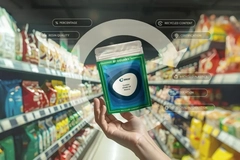INC-5.2: Corporate lobbyists challenge plastic production cuts and waste management reform in Africa
INC-5.2 negotiations need to focus on reducing plastic production and harmful waste management practices in Africa, according to Merissa Naidoo, plastic program manager at the Global Alliance for Incinerator Alternatives (GAIA) and Break Free From Plastic Africa. But while environmentalists advocate for significant plastic production cuts, corporate influence is said to be stronger compared to previous negotiation rounds.
“The UN Global Plastic Treaty represents such a momentous and opportunistic moment for us in world history, where global leaders have recognized that this problem transgresses boundaries,” Naidoo tells Packaging Insights.
GAIA has attended multiple contact groups at the negotiations to discuss various articles of the proposed treaty, such as article three, concerning plastic products and chemicals, and article five, focusing on product design.

Ending harmful waste management
Harmful waste management practices in the Global South are of significant concern for Naidoo. She indicates that in the INC-5.2 negotiations, it is “essential” to establish cohesion between the UN Global Plastic Treaty and the Basel Convention, which addresses waste management.
“We need the waste management article to exclude plastic waste management practices that harm the environment, health, and human rights. This includes plastic burning, whether open or controlled in incinerators, cement kilns, pyrolysis, or chemical recycling.”
 Merissa Naidoo, plastic program manager, GAIA (Image credit: GAIA)In one contact group at INC-5.2, Naidoo expresses the exclusion of energy recovery and waste-to-energy approaches is causing contention among groups.
Merissa Naidoo, plastic program manager, GAIA (Image credit: GAIA)In one contact group at INC-5.2, Naidoo expresses the exclusion of energy recovery and waste-to-energy approaches is causing contention among groups.
She highlights that this group received a “robust” proposal from the UK and Panama concerning emissions and leaks in waste management systems, explaining that it aims to address these issues across the full life cycle of plastics, not just at disposal.
“Closing the tap”
Naidoo states that while waste management must be addressed, it is not enough to end plastic pollution, especially in Africa. She asserts: “If we’re not closing the tap upstream and are only worried about mopping the floor, it’s not going to get us anywhere.”
In one contact group at INC-5.2, a proposal put forward by Switzerland and Mexico — and backed by 77 countries — calls for a ban on the trade of hazardous plastic products and chemicals.
“We need waste management within this text to focus on plastic prevention as being one of the top tiers of the waste hierarchy. The Basil Convention is meant to address waste management, but it is currently weak and has voluntary guidance,” adds Naidoo.
Lobbyists dominate talks
At the negotiations, Naidoo and others have reported the strong presence of industry lobbyists compared to previous talks, raising concerns about corporate influence. Analysis by the Center for International Environmental Law has revealed that at the IN5-5.2 negotiations:
- Fossil fuel and chemical industry lobbyists outnumber the combined diplomatic delegations of all 27 EU nations and the EU (233)
- Nineteen fossil fuel and chemical lobbyists have secured places in the national delegations of Egypt (6), Kazakhstan (4), China (3), Iran (3), Chile (2), and the Dominican Republic (1)
- Chemical and fossil fuel industry lobbyists outnumber the Scientists’ Coalition for an effective plastic treaty (60) by nearly four to one, and the International Indigenous Peoples’ Forum on Plastics (36) by almost seven to one.
Naidoo argues: “The fossil fuel and petrochemical industries have captured these negotiations. Their unchecked production of plastics is accelerating a crisis that jeopardizes the climate, biodiversity, human health, and the planet’s ability to sustain life.”
Waste pickers and women’s rights
Naidoo explains that many in Africa are concerned with the newly emerging global market for “plastic credits,” a financial system that aims to incentivize the removal of plastic waste from the environment.
Effectiveness of recycling systems in the Global South influenced by discrimination toward female waste-pickers, says Naidoo. She highlights that a project in Kenya, led by Taka Taka Solutions and funded by the Alliance to End Plastic Waste — an initiative backed by petrochemical giants like Shell and ExxonMobil — aims to support better pay and working conditions for waste pickers.
However, according to Naidoo, at least ten waste pickers and sector representatives have reported no change in working conditions. The waste pickers have accused Taka Taka solutions of “excluding them from the recycling sector altogether, putting their livelihoods at risk.”
Naidoo notes that a growing number of waste pickers in Africa are women, especially in female-headed households, as waste picking has become a key source of income to support their families.
She explains: “Women waste pickers often face discrimination in a male-dominated industry. This includes harassment and assault, and everything from receiving unfair prices from the middleman that is trying to buy their goods, to the lack of access to leadership positions within recycling cooperatives and centers.”
Naidoo states that the position of women waste pickers is gaining more attention within the context of the UN Global Plastic Treaty, noting that “the barriers they face not only harm their livelihoods, but also threaten the effectiveness of recycling systems in the Global South.”













